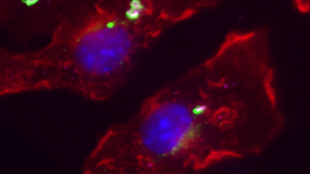 Fluorescent micrograph of Gbp1 (green) targeting mycobacteria (magenta rods) in interferon-activated macrophages (red, actin staining; blue, nuclear staining) IMAGE COURTESY OF JOHN MACMICKING
Fluorescent micrograph of Gbp1 (green) targeting mycobacteria (magenta rods) in interferon-activated macrophages (red, actin staining; blue, nuclear staining) IMAGE COURTESY OF JOHN MACMICKING
Researchers have identified the function of an obscure but large family of proteins whose function in cellular immune responses had been unknown.
Guanylate-binding proteins, Gbps for short, protect cells from pathogens that have snuck into a cell by activating cellular degradation machinery, according to a study published today (May 5) in Science. Understanding how the proteins work could help spur the development of small drug molecules to activate a cell's own defenses against infection, a potential alternative to antibiotics.
"The function of the Gbps remained mysterious for a very long time despite the fact that they are produced in massive amounts upon infection," said Sascha Martens, who studies autophagy at the Max F. Perutz Laboratories in Austria and was not involved in the research, in ...




















